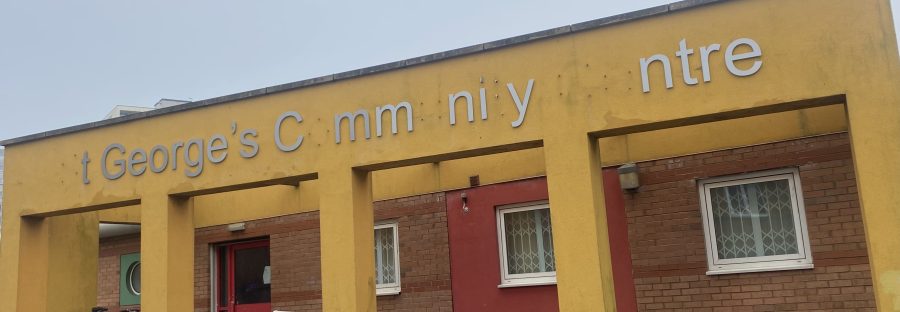Changing young lives in inner city Manchester: how St George’s community centre is helping young people
- St George's Community Centre working with charity YPAC in youth work in inner city Manchester
- Chris Macintosh, who runs the youth group, works with youngsters aged between 11 and 18
“The value of youth work is about making a young person understand themselves better,” explains youth worker Chris Macintosh.
Chris works out of St George’s, a social hub for people in Collyhurst and home to Youth Project at Apostles and Cuthberts (YPAC).
It focusses on helping young people by organising playgroups, a junior youth group as well as a senior youth group, with ages spanning from 6 – 19.
The aim is to allow them to “have the opportunity to increase their skills, aspirations and confidence,” Chris comments.
Many of the children YPAC works with in Collyhurst are second-generation African immigrants.
When the Northern Quota visited the centre was being set up for for the 16 to 18-year-olds. Chris gave a tour around the facilities and we settled in one of the conversation nooks to hear more about the work he is doing.
Most of the young people who attend activities during the week come from Miles Platting and many see the YPAC staff at least once-a-week.
Chris, who has been with YPAC at St George’s for the last six years, oversees the operation of the charity.
“I have always felt an affinity to inner city Manchester,” he says.
“I did youth work in Ardwick and Longsight for around 15 years.”
He explained the ways in which the centre integrates with the community and its philosophy of youth work.
“We initially started with a transition group to help year six children settle in better into secondary.”
Around 15 children filter through the different youth sessions at St George’s as they grew up. Chris say they operate two different types of youth work, “building-based work as well as detached youth work.”
Building-based work consists of sessions within the community centre.
Chris remarked: “As a youth worker, you are working with young people the best you can, but you are also responsible for the spaces you use.
“So if people are being destructive of this space, you’ve got to manage the safety of the space, and for some young people that is too much for them.”

Detached youth work is where and his team go out into the community and approach young people in person.
He says: “It’s about making relationships with young people on the streets.”
Working in Collyhurst and Miles Platting, Chris explains that “doing this, on these estates can be quite dramatic”.
Chirs, who works in a team of 10, said tensions within the community have heightened over the last few years.
“The people that generally approach the youth on the streets, either want to do them harm, or are the police who have negative intentions.
“With detached youth work you find yourself working closer with the families, and especially with younger children.
“The biggest tool in youth work is the person that is doing it.”
Youth workers can have very different life experiences and upbringings to the children they work with. The question of how they empathise with the experiences of the young community is tackled by “conversations” they have with young adults.
“A lot of our older youth workers have a lot of experience with inner city areas that have the same issues,” Chris explains.
“There are a lot of common themes that run through inner city areas: poor family make-up, low literacy and numeracy levels, engagement in school, poor mental health, and big issues around poverty.
“The undercurrent of illegal activity, poor access to jobs. There’s quite a lot to handle in areas like this.
“We can’t change who we are as youth workers. There will be blind spots and things you don’t know about unconscious bias, but we have quite a reflective team, so we’ve got people that are aware of their work and of themselves in these situations.”
Reflecting on their actions and what is best for individuals, as well as the wider youth group, keeps the sessions relevant and engaging.
One current YPAC project is working with young people from east Manchester to set up, design and manage a youth bank foryoung people to apply to for funding, kincollaboration with oEast Manchester Youth, Play Partnership and Youth Bank International.
Other activities include setting up sessions with Lab51 Studios to allow older youths to make their own music. Activities over the summer involve going to theme parks and organising trips to activity centres.
YPAC’s aims to integrate young people into the wider community through giving them a safe space and a place to meet up each week.


